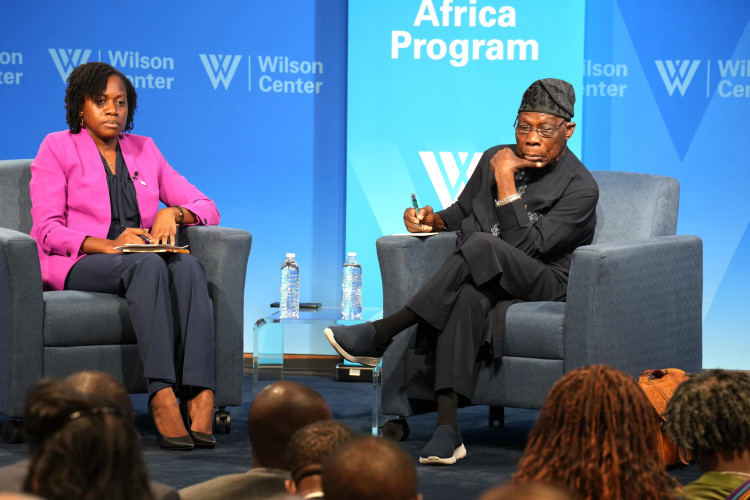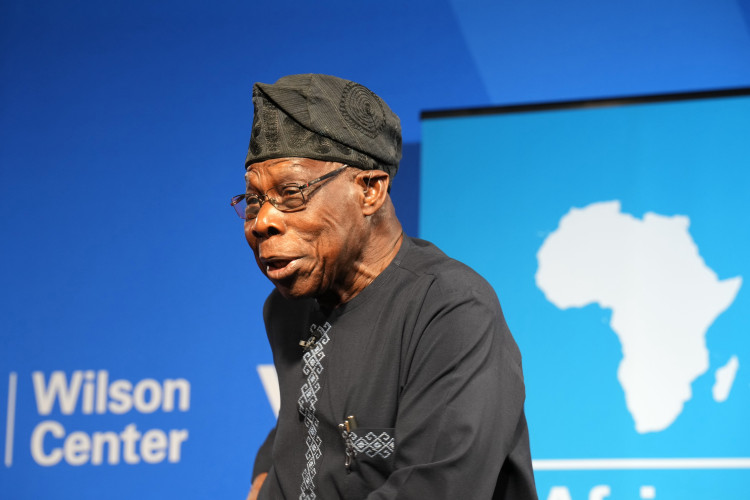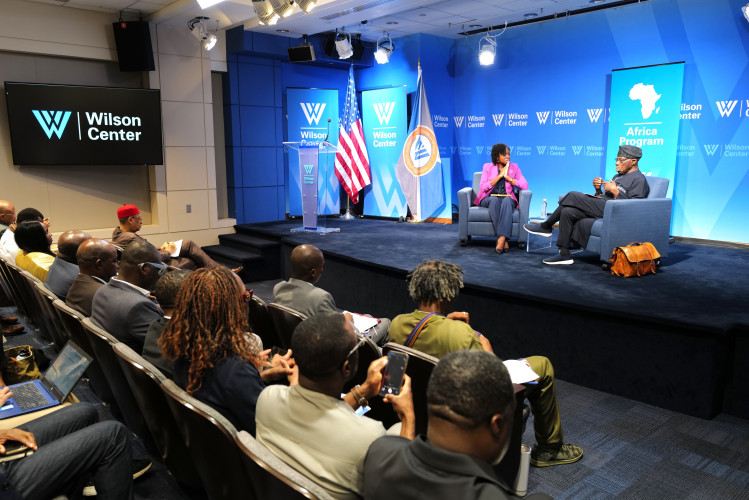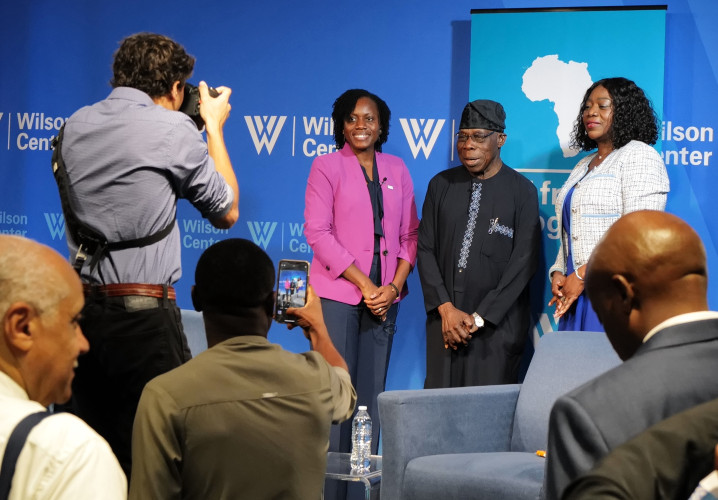From the Open-Publishing Calendar
From the Open-Publishing Newswire
Indybay Feature
Former Nigerian President Discusses US-Africa Relations
WASHINGTON (08-07) – Kicking off its inaugural African Leadership Perspective Series at the Wilson Center to discuss an everchanging geopolitical landscape, was former Nigerian President H.E Olusegun Obasanjo. The program is designed around a series of conversations with African public figures and former African heads of state to discuss “US-Africa relations, reflect on the past and current state of leadership in Africa and to share their insights on contemporary peace, security, and economic development opportunities or challenges facing the continent.”
WASHINGTON (08-07) – Kicking off its inaugural African Leadership Perspective Series at the Wilson Center to discuss an everchanging geopolitical landscape, was former Nigerian President H.E Olusegun Obasanjo. The program is designed around a series of conversations with African public figures and former African heads of state to discuss “US-Africa relations, reflect on the past and current state of leadership in Africa and to share their insights on contemporary peace, security, and economic development opportunities or challenges facing the continent.”
Former President Obasanjo has twice served as president, once in 1976 in the aftermath of the assassination of Murtala Ramat Muhammed and later when he was elected in 1999. He was the first president to lead Nigeria out of decades of military rule and “During his two terms, played a key role in the creation of the Africa Union (AU) and in the resolution of several political crises on the continent. Following the conclusion of his presidency in May 2007, he has built a profile as a respected African elder statesman. He has served in numerous leadership positions including as a special United Nations and AU envoy addressing some of Africa's most urgent problems.”
Speaking without notes to Oge Onubogu, Wilson Center, Africa Programs director, the very sharp 87-year-old elaborated on several issues that he had resolved on the continent during his career. He went on to discuss how American and Chinese roles in Africa are perceived from an African perspective and how working together among Africans on conflict resolution is a better choice than relying on outside involvement.
In illustrating why Africa matters he related that “It is not a question does Africa matter. You cannot say that 1.2 billion people in the world do not matter. If you say that something must be wrong with you.” Obasanjo went on to relate how once when he was in the U.S. a friend of his was trying to sell things to a then less open China. So, he asked why the friend was going to China? The man responded “General, can’t you understand? You are a poultry farmer,” I said “Yes.” He said “You imagine that every man and woman in China eat one egg a week. That would be 1.2 billion eggs a week. And if you can sell eggs in China, you know what that means.”
In describing the failure to prevent the removal of the Kaddafi regime in Libya, Onubogu said, that at the time, “The collective action we (AU) were having was broken” and that “We believed we could handle the issue of Libya if left in our hands. When issues are taken from our hands, when we thought we can handle them and are not allowed to handle them, they are not handled well. And when they are mishandled, we are left with amess in our hands. The genocide in Rwanda was badly handled and we haven’t gotten out of the mess of Libya.”
In describing a “difficult situation,” he cited that of Saddam Hussein in Iraq when President Mubarak of Egypt sent him “a personal SOS message” and he went to Cairo for a meeting. Mubarak said: “Hussein is a difficult man. But he has maintained stability in his country and in the region and until we can get a replacement for Hussein, let us appeal to our American partner and friend to see how best we can handle this.”
This prompted Obasanjo to fly to Washington saying that “I made a presentation, and the presentation was thought a good presentation, the response was, ‘Whether you are with us or not, we have made up our minds and our plan to go for Sadam Hussein.’ And that is what happened and the mess of removing Sadam Hussein is still with us today, just like the one of Libya.”
Regarding economics, Onubogu characterized China’s growing interest and investments in the continent by saying “We had greater inflow from China into Africa.” He admitted “…that helped us particularly in the first decade of this century.” As a result, African products and commodities have realized higher prices in this relationship. In response, he described that “Our western partners were not too happy. What they said to us was demeaning, ‘Oh how are you getting along with your new colonial masters?’” He questioned that statement by asking “If China decides to buy things from us, why are they our colonial masters? If they help us with infrastructure, do they become a colonial master as a result? If China is holding a huge amount of American Treasury bills, does that make China a colonial master of America?”
On the importance of working together in conflict resolution Onubogu related his work in Angola by saying that “We had in Angola, Cuban troops, we had in Angola South African troops, and in talking to the West we came to the idea that, look, let Cuban troops withdraw, let South African troops withdraw, let Angola have its own security and stability and let Namibia be independent.” He described the president of Angola as finding it difficult to tell Castro “Come and withdraw your troops with all they have done. And they did a lot of good.” So, the Angolan president asked Obasanjo to go to Cuba to talk with Fidel Castro.
In Cuba, Onubogu told Castro that “I come to tell you that we are at the point of getting victory in Angola. So, Castro brought out the battle map of Angola and I said, If Cuban troops are withdrawn, South African troops will be withdrawn, and Namibia will be independent.” Castro said “Is that what you call victory? He wasn’t too happy, but he agreed.” Castro then told him that “I will take out all Cuban troops, dead and alive,” describing that pivotal decision as a “win-win” for everybody.
“Where we have worked together, we have succeeded together.” Noting, however, that when things were taken out of their (African) hands, “It has never turned out for the better.”
Looking at present security issues, Onubogu spoke of the deteriorating conditions in the Sahel and its effect for the region, relating that on his way to the U.S. this week he stopped unannounced in Togo and that “President Faure rushed to the airport to see me.” The two engaged in a conversation that included the Sahel and Onubogu commented that “ECOWAS not holding Sahel as it should, will lead to a mess in that region. You have America, Ukraine, Russia and Türkiye in a small place. That is the backyard of Nigeria. That is a disaster.”
Predicting that “America will not sit down and fold its hands rightly while the Sahel comes under Russia.”
In closing, Onubogu addressed an audience question regarding food security and the reliance of foreign sources versus domestic supplies at elevated costs by saying “Never outsource your food security, whoever feeds you can enslave you.”
Report and photos by Phil Pasquini
© 2024 nuzeink all rights reserved worldwide
Former President Obasanjo has twice served as president, once in 1976 in the aftermath of the assassination of Murtala Ramat Muhammed and later when he was elected in 1999. He was the first president to lead Nigeria out of decades of military rule and “During his two terms, played a key role in the creation of the Africa Union (AU) and in the resolution of several political crises on the continent. Following the conclusion of his presidency in May 2007, he has built a profile as a respected African elder statesman. He has served in numerous leadership positions including as a special United Nations and AU envoy addressing some of Africa's most urgent problems.”
Speaking without notes to Oge Onubogu, Wilson Center, Africa Programs director, the very sharp 87-year-old elaborated on several issues that he had resolved on the continent during his career. He went on to discuss how American and Chinese roles in Africa are perceived from an African perspective and how working together among Africans on conflict resolution is a better choice than relying on outside involvement.
In illustrating why Africa matters he related that “It is not a question does Africa matter. You cannot say that 1.2 billion people in the world do not matter. If you say that something must be wrong with you.” Obasanjo went on to relate how once when he was in the U.S. a friend of his was trying to sell things to a then less open China. So, he asked why the friend was going to China? The man responded “General, can’t you understand? You are a poultry farmer,” I said “Yes.” He said “You imagine that every man and woman in China eat one egg a week. That would be 1.2 billion eggs a week. And if you can sell eggs in China, you know what that means.”
In describing the failure to prevent the removal of the Kaddafi regime in Libya, Onubogu said, that at the time, “The collective action we (AU) were having was broken” and that “We believed we could handle the issue of Libya if left in our hands. When issues are taken from our hands, when we thought we can handle them and are not allowed to handle them, they are not handled well. And when they are mishandled, we are left with amess in our hands. The genocide in Rwanda was badly handled and we haven’t gotten out of the mess of Libya.”
In describing a “difficult situation,” he cited that of Saddam Hussein in Iraq when President Mubarak of Egypt sent him “a personal SOS message” and he went to Cairo for a meeting. Mubarak said: “Hussein is a difficult man. But he has maintained stability in his country and in the region and until we can get a replacement for Hussein, let us appeal to our American partner and friend to see how best we can handle this.”
This prompted Obasanjo to fly to Washington saying that “I made a presentation, and the presentation was thought a good presentation, the response was, ‘Whether you are with us or not, we have made up our minds and our plan to go for Sadam Hussein.’ And that is what happened and the mess of removing Sadam Hussein is still with us today, just like the one of Libya.”
Regarding economics, Onubogu characterized China’s growing interest and investments in the continent by saying “We had greater inflow from China into Africa.” He admitted “…that helped us particularly in the first decade of this century.” As a result, African products and commodities have realized higher prices in this relationship. In response, he described that “Our western partners were not too happy. What they said to us was demeaning, ‘Oh how are you getting along with your new colonial masters?’” He questioned that statement by asking “If China decides to buy things from us, why are they our colonial masters? If they help us with infrastructure, do they become a colonial master as a result? If China is holding a huge amount of American Treasury bills, does that make China a colonial master of America?”
On the importance of working together in conflict resolution Onubogu related his work in Angola by saying that “We had in Angola, Cuban troops, we had in Angola South African troops, and in talking to the West we came to the idea that, look, let Cuban troops withdraw, let South African troops withdraw, let Angola have its own security and stability and let Namibia be independent.” He described the president of Angola as finding it difficult to tell Castro “Come and withdraw your troops with all they have done. And they did a lot of good.” So, the Angolan president asked Obasanjo to go to Cuba to talk with Fidel Castro.
In Cuba, Onubogu told Castro that “I come to tell you that we are at the point of getting victory in Angola. So, Castro brought out the battle map of Angola and I said, If Cuban troops are withdrawn, South African troops will be withdrawn, and Namibia will be independent.” Castro said “Is that what you call victory? He wasn’t too happy, but he agreed.” Castro then told him that “I will take out all Cuban troops, dead and alive,” describing that pivotal decision as a “win-win” for everybody.
“Where we have worked together, we have succeeded together.” Noting, however, that when things were taken out of their (African) hands, “It has never turned out for the better.”
Looking at present security issues, Onubogu spoke of the deteriorating conditions in the Sahel and its effect for the region, relating that on his way to the U.S. this week he stopped unannounced in Togo and that “President Faure rushed to the airport to see me.” The two engaged in a conversation that included the Sahel and Onubogu commented that “ECOWAS not holding Sahel as it should, will lead to a mess in that region. You have America, Ukraine, Russia and Türkiye in a small place. That is the backyard of Nigeria. That is a disaster.”
Predicting that “America will not sit down and fold its hands rightly while the Sahel comes under Russia.”
In closing, Onubogu addressed an audience question regarding food security and the reliance of foreign sources versus domestic supplies at elevated costs by saying “Never outsource your food security, whoever feeds you can enslave you.”
Report and photos by Phil Pasquini
© 2024 nuzeink all rights reserved worldwide
For more information:
https://www.facebook.com/media/set/?vanity...
Add Your Comments
We are 100% volunteer and depend on your participation to sustain our efforts!
Get Involved
If you'd like to help with maintaining or developing the website, contact us.
Publish
Publish your stories and upcoming events on Indybay.
Topics
More
Search Indybay's Archives
Advanced Search
►
▼
IMC Network






